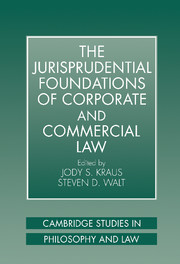Book contents
- Frontmatter
- Contents
- Contributors
- Introduction
- 1 Karl Llewellyn and the Origins of Contract Theory
- 2 Economic Efficiency and the Ex Ante Perspective
- 3 Constrained Optimization: Corporate Law and the Maximization of Social Welfare
- 4 Do Trade Customs Exist?
- 5 The Uniformity Norm in Commercial Law: A Comparative Analysis of Common Law and Code Methodologies
- 6 In Defense of the Incorporation Strategy
- Index
2 - Economic Efficiency and the Ex Ante Perspective
Published online by Cambridge University Press: 22 September 2009
- Frontmatter
- Contents
- Contributors
- Introduction
- 1 Karl Llewellyn and the Origins of Contract Theory
- 2 Economic Efficiency and the Ex Ante Perspective
- 3 Constrained Optimization: Corporate Law and the Maximization of Social Welfare
- 4 Do Trade Customs Exist?
- 5 The Uniformity Norm in Commercial Law: A Comparative Analysis of Common Law and Code Methodologies
- 6 In Defense of the Incorporation Strategy
- Index
Summary
Introduction
In 1985, Frank Easterbrook received the prestigious invitation to write the foreword to the Harvard Law Review's annual issue on the Supreme Court. Unlike most of his illustrious fellow foreword authors, he chose to consider a broad range of Supreme Court decisions, not just the comparatively few rulings on major constitutional issues. Easterbrook – then a professor, now a federal appeals judge – argued that a major change had taken place in the Court's legal reasoning: a switch from looking back to the past to looking ahead to the future.
As Easterbrook pointed out, the traditional judicial function was resolving disputes. “For a long time,” he said, “courts portrayed rule creation as a by-product of dispute resolution. The court had to decide a case, and in order to show that its decision was not capricious it often had to announce a rule to govern future cases.” But dispute resolution is “backward looking,” based on the “equities” of the dispute. It revolves around fairness, “an equitable division of the gains or losses among existing parties given that certain events have come to pass.” In short, “[f]airness arguments are ex post arguments,” and lawyers find it hard to argue about cases without invoking the ideal of fairness.
This retrospective approach is understandable, Easterbrook says.
- Type
- Chapter
- Information
- Publisher: Cambridge University PressPrint publication year: 2000
- 7
- Cited by

